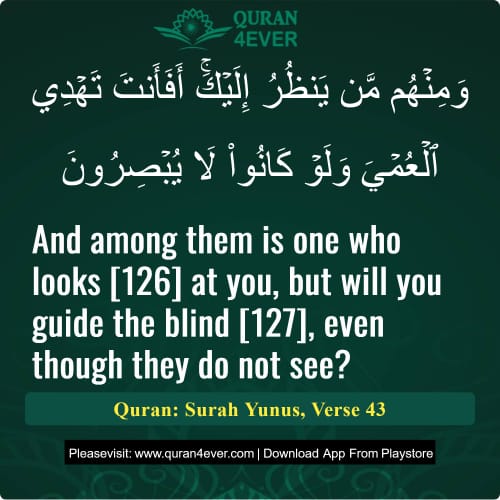
Transliteration:( Wa minhum mai yanzuru ilaik; afa anta tahdil 'umya wa law kaanoo laa yubsiroon )
"And among them is one who looks [126] at you, but will you guide the blind [127], even though they do not see?" (Kanzul Imaan Translation)
This verse emphasizes that true understanding comes from the eye of intelligence, not just the physical eye. Many saw the Prophet Muhammad (ﷺ) as simply Muhammad bin Abdullah, but only those who saw him as Muhammad ur Rasoolullah (the Messenger of Allah) were granted the honor of being close to him and inheriting Paradise. Those who only observed him outwardly were spiritually blind, cut off from all guidance. The verse suggests that mere physical sight does not equate to true spiritual insight, which is essential for belief and understanding.
The verse uses the metaphor of the blind to refer to those who are spiritually and intellectually closed off. While they may physically see the Prophet (ﷺ), they do not recognize his true grandeur or significance. The inner eye is necessary to perceive his true status, and those who are spiritually blind, like Abu Jahl, failed to see the Prophet (ﷺ) with this inner eye, despite having observed him physically. Just as we look at loved ones with different eyes, we must look at the Messenger of Allah with a perspective that goes beyond the ordinary to recognize his divine status.
The tafsir of Surah Yunus verse 43 by Ibn Kathir is unavailable here.
Please refer to Surah Yunus ayat 41 which provides the complete commentary from verse 41 through 44.
(10:43) And of them some look towards you; will you, then, guide the blind, even though they can see nothing?[51]
51. Here again they may be likened to animals which see with their eyes but cannot perceive anything beyond what appears on the surface. Likewise those people saw the Prophet (peace be upon him) and his companions, but did not perceive their pure life for they did not have the true vision to see the wonderful change that was coming in the lives of those who had listened to and accepted the Message.
As has been pointed out in (Surah Yunus, ayat 42) note 50, though these verses were addressed to the Prophet (peace be upon him), they were really meant to reprove and admonish the disbelievers in a subtle manner so as to arouse their dormant faculties of hearing and seeing and open these for the reception and acceptance of the rational and sympathetic Message. In order to understand the wisdom of this indirect method of admonition, let us take the example of two righteous friends. One of them who lived among corrupt people did his very best to convey the righteous message both by precept and by practice. He set the model of the highest moral conduct and character before them, and urged them in a sincere and sympathetic manner to consider their own moral condition, and admonished them in a very sincere and rational manner to make them realize that they were living in a very corrupt moral state, and advised them to adopt the right way of life. But none of them would pay any attention to his admonition nor learn any lesson from his pure life. Suppose his friend came there at that time and said: Why are you giving advice to these deaf people and showing the way to these blind ones, who have no ears for good things and no eyes for the right way? It is obvious that these words would not have been uttered by way of dissuading the first friend from doing his reform work but for arousing the dormant faculties of the corrupt people by this subtle indirect method.

For a faster and smoother experience,
install our mobile app now.
Related Ayat(Verses)/Topics